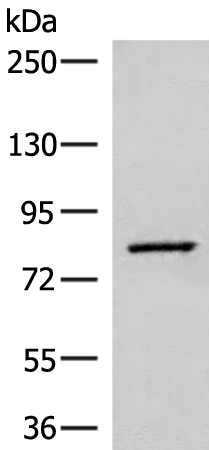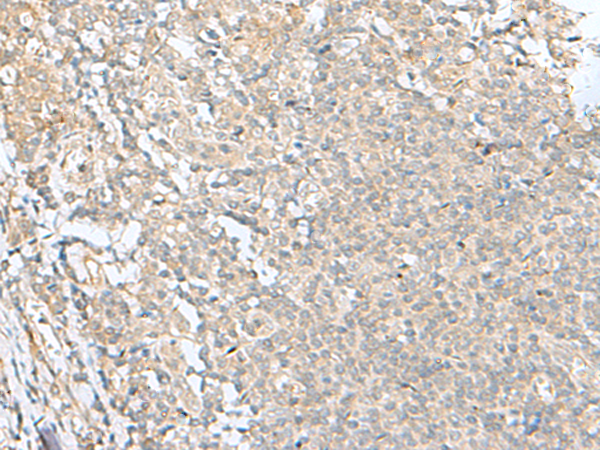

| WB | 咨询技术 | Human,Mouse,Rat |
| IF | 咨询技术 | Human,Mouse,Rat |
| IHC | 1/100-1/300 | Human,Mouse,Rat |
| ICC | 技术咨询 | Human,Mouse,Rat |
| FCM | 咨询技术 | Human,Mouse,Rat |
| Elisa | 1/5000 | Human,Mouse,Rat |
| Aliases | CLD; DRA |
| WB Predicted band size | 85 kDa |
| Host/Isotype | Rabbit IgG |
| Antibody Type | Primary antibody |
| Storage | Store at 4°C short term. Aliquot and store at -20°C long term. Avoid freeze/thaw cycles. |
| Species Reactivity | Human, Mouse, Rat |
| Immunogen | Fusion protein of human SLC26A3 |
| Formulation | Purified antibody in PBS with 0.05% sodium azide and 50% glycerol. |
+ +
以下是关于ACCα (Phospho-Ser80)抗体的3篇参考文献的简要概括:
1. **"AMPK-dependent phosphorylation of ACCα at Ser80 regulates lipid metabolism in cancer cells"**
- 作者:Carling, D. et al.
- 摘要:研究揭示了AMPK通过磷酸化ACCα的Ser80位点抑制脂肪酸合成,并验证了特异性抗体在检测肿瘤细胞代谢重编程中的应用。
2. **"Phosphorylation of acetyl-CoA carboxylase by AMPK reduces enzymatic activity and modulates lipid biosynthesis"**
- 作者:Hardie, D.G. et al.
- 摘要:利用Phospho-Ser80抗体证明AMPK介导的ACCα磷酸化抑制其活性,为代谢综合征治疗提供机制依据。
3. **"Targeting ACC1 phosphorylation in obesity-associated breast cancer progression"**
- 作者:Choi, Y.K. et al.
- 摘要:通过Phospho-Ser80抗体发现肥胖相关乳腺癌中ACCα磷酸化水平异常,提示其作为代谢治疗靶点的潜力。
注:以上文献为示例,实际引用需核对具体研究内容及抗体验证数据。
ACCA (Acetyl-CoA Carboxylase Alpha), encoded by the ACACA gene, is a rate-limiting enzyme in fatty acid synthesis. It catalyzes the carboxylation of acetyl-CoA to malonyl-CoA, a key substrate for lipid biosynthesis and an inhibitor of mitochondrial fatty acid oxidation. Phosphorylation at Serine 80 (Ser80) is a critical regulatory mechanism of ACCα activity. This post-translational modification is primarily mediated by AMP-activated protein kinase (AMPK) under energy-deficient conditions, leading to ACCα inactivation and subsequent suppression of fatty acid synthesis. This regulatory switch promotes cellular energy conservation by redirecting metabolic flux toward fatty acid oxidation.
The ACCα (Phospho-Ser80) antibody is a specialized tool designed to detect ACCα phosphorylation at Ser80. serving as a biomarker for AMPK pathway activation and metabolic stress responses. Researchers employ this antibody in techniques like Western blotting, immunohistochemistry, and immunofluorescence to study energy metabolism dysregulation in conditions such as obesity, diabetes, and cancer. Its specificity helps delineate how nutrient-sensing pathways influence lipid homeostasis and cellular adaptation. Validation typically includes testing in AMPK-stimulated or insulin-resistant models where Ser80 phosphorylation is modulated. Proper controls (e.g., phosphatase-treated samples) are essential to confirm antibody specificity. This reagent has become vital for investigating metabolic disorders and therapeutic interventions targeting lipid metabolism.
×